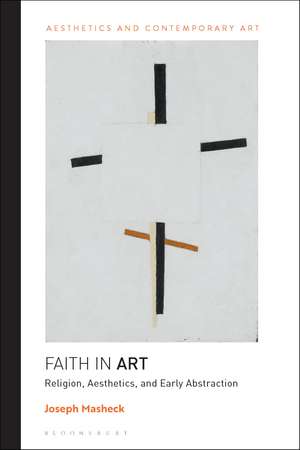Faith in Art: Religion, Aesthetics, and Early Abstraction: Aesthetics and Contemporary Art
Autor Professor Joseph Mashecken Limba Engleză Hardback – 12 iul 2023
Preț: 510.60 lei
Preț vechi: 731.29 lei
-30% Nou
Puncte Express: 766
Preț estimativ în valută:
97.70€ • 102.28$ • 80.84£
97.70€ • 102.28$ • 80.84£
Carte tipărită la comandă
Livrare economică 07-21 aprilie
Livrare express 01-07 martie pentru 119.53 lei
Preluare comenzi: 021 569.72.76
Specificații
ISBN-13: 9781350216976
ISBN-10: 1350216976
Pagini: 240
Ilustrații: 27 bw illus
Dimensiuni: 156 x 234 x 25 mm
Greutate: 0.51 kg
Editura: Bloomsbury Publishing
Colecția Bloomsbury Academic
Seria Aesthetics and Contemporary Art
Locul publicării:London, United Kingdom
ISBN-10: 1350216976
Pagini: 240
Ilustrații: 27 bw illus
Dimensiuni: 156 x 234 x 25 mm
Greutate: 0.51 kg
Editura: Bloomsbury Publishing
Colecția Bloomsbury Academic
Seria Aesthetics and Contemporary Art
Locul publicării:London, United Kingdom
Caracteristici
Includes art historical approaches e.g. thinking about artworks in the context of Russian revolution or Stalinist era
Notă biografică
Joseph Masheck received the Distinguished Lifetime Achievement Award for Writing on Art, of the College Art Association, in 2018. He is Professor Emeritus of Art History at Hofstra University, Hempstead, New York, having also taught at Columbia and Harvard, USA.
Cuprins
List of FiguresAcknowledgementsList of AbbreviationsIntroduction1. An Orthodox Kandinsky2. A Protestant Mondrian3. A Catholic Malevich4. A Jewish LissitzkyConclusionNotesIndexBibliography
Recenzii
In this rich and beautifully written book Masheck argues for the serious place of religion as opposed to the vague term spirituality in four founding artists of abstraction. Against the complex background of European culture the central place of Christian and Jewish theology and liturgy from icon to the writings of Karl Barth is affirmed and luminously presented. An intellectual and aesthetic feast.
Masheck brilliantly corrects two blind spots regarding 'religion' in the history of modern art-first, by illuminating how Jewish and Christian conceptualities shaped the work of four pivotal modernists and, second, by exploring these as theological rather than (mis)attributing them to occultist spiritualities. The resulting account opens the history of modernism into lines of inquiry that art scholars have not yet adequately accounted for.
Masheck brilliantly corrects two blind spots regarding 'religion' in the history of modern art-first, by illuminating how Jewish and Christian conceptualities shaped the work of four pivotal modernists and, second, by exploring these as theological rather than (mis)attributing them to occultist spiritualities. The resulting account opens the history of modernism into lines of inquiry that art scholars have not yet adequately accounted for.












